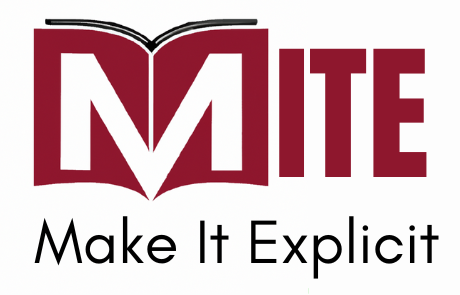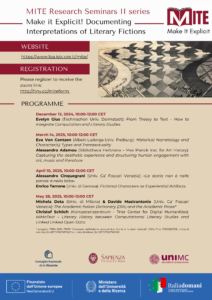Research seminars in the context of the MITE project will feature prominent scholars in the fields of digital humanities, language and literature, philosophy, and computer science.
To participate, please fill out the following form: http://tiny.cc/miteform.
All seminars will be held online at Rome time.
Participants will receive the link to join the meeting a few days in advance.
December 12, 2024, 10:00-12:00 (more info here)
1. Short recap on MITE
2. Evelyn Gius (University of Darmstadt, Institute of Linguistics and Literary Studies, Germany): From Theory to Text – How to integrate Computation and Literary Studies
<Pause at the beginning of 2025 because of the MITE Workshop at the University of Macerata on February 4-5, 2025 (information soon), and the deadline of our Special Issue on Humanities >
March 14, 2025, 10:00-12:00 (more info here)
1. Alessandro Adamou (Bibliotheca Hertziana, Max Planck Institute for Art History): Capturing the aesthetic experience and structuring human engagement with art, music and literature
2. Eva Von Contzen (Albert-Ludwigs-Universität Freiburg): Historical Narratology and Character(s): Types and Transtextuality
April 10, 2025 10:00-12:00 (more info here)
1. Alessandro Cinquegrani (Dipartimento di Studi Umanistici, Università Ca’ Foscari Venezia), «La storia non è nelle parole: è nella lotta»
2. Enrico Terrone (Dipartimento di Antichità, filosofia e storia, Università di Genova, Italy), Fictional Characters as Experiential Artifacts
May 28, 2025, 10:00-12:00 (more info here)
1. Michela Dota, Università degli Studi di Milano & Davide Mastrantonio, Università Ca’ Foscari Venezia: The Academic Italian Dictionary (DIA) and the Academic Prose
2. Christof Schöch (Trier Center for Digital Humanities, Germany): MiMoText – Literary History between Computational Literary Studies and Linked Linked Open Data

